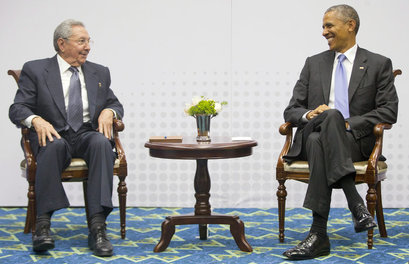|
“If you’re being offered the ambassadorship to Cuba, turn it down because you have a snowball’s chance in hell of getting confirmed,” he said, according to the Wall Street Journal.
Some of the original restrictions that make up the Cuban embargo were authorized by U.S. presidents almost 100 years ago, relying on the Trading with the Enemy Act of 1917. Congress later codified the Cuban embargo in the Helms-Burton law of 1996, also called the “Libertad” act. The president, however, has the ability to alter federal regulations based on the 1996 law. “The president can go very far,” said Serena Moe, of the law firm Wiley, Fein & Fielding in Washington and former sanctions official at the Treasury Department. “He’s gone very far in his recommendations and he can go further,” they said. The next step for normalizing relations is removing Cuba from the US list of state sponsors of terrorism. Obama’s plan to remove the island nation would contribute to lifting some restrictions allowing the US State Treasury and Commerce departments to re-establish relations as well as open a US Embassy and relax trade limits. Expanded travel tourism would also benefit. While the President’s proposal to remove Cuba from the list after decades of hostilities was met with approval from Sen. Ben Cardin (D-MD) the top Democrat on the Senate Foreign Relations Committee, the Republican dominated Congress could pass a resolution seeking to derail the president’s decision with a veto-proof majority. Hard line Republicans like Marco Rubio who represent the old guard of Cuban aristocrats who fled Cuba to the US in the 1960s still ascribe to the cold war mentality that is unproductive. Obama’s policies appear to winning over Cuban Americans. Just over half, 51 percent, of Cuban-Americans polled by Bendixen & Amandi International last March said they were in favor of normalized relations between the U.S. and Cuba, while 40 percent disagreed in a report by the National Journal. Then a shift occurred toward normalization over the past few months. The same polling group found that 48 percent of Cuban-Americans disagreed with Obama's new Cuba policy in December, compared with 44 percent who approved. But many Republicans, who generally oppose the president’s priorities, view restoring ties with Cuba as beneficial, especially because of the business opportunities it would open for U.S. business. Latin American expert Carl Meacham said in Politico, “What’s happening now is basically a turning of the page away from an approach to dealing with the region on Cold War terms. The signal event is the United States has chosen to not continue having the same policy toward Cuba that it’s had for like 50 years that was rooted in the Cold War and Cold War thinking.” Resources NPR Washington Post Politico http://www.wsj.com/articles/obama-faces-battle-with-congress-over-cuba-1419211849 http://www.nationaljournal.com/politics/poll-cuban-americans-shift-in-favor-of-normalizing-u-s-cuba-relations-20150402
3 Comments
ken
15/4/2015 09:24:39 am
Now all they need to do is to normalize relations with Venezuela instead of trying for regime change and helping to mount coups.
Reply
Dava Castillo
15/4/2015 10:24:00 am
Thanks for reading and commenting Ken.
Reply
Leave a Reply. |
Dava Castillo
is retired and lives in Clearlake, California. She has three grown
children and one grandson and a Bachelor’s degree in Health Services
Administration from St. Mary’s College in Moraga California. On the
home front Dava enjoys time with her family, reading, gardening, cooking
and sewing. Archives
November 2015
|


